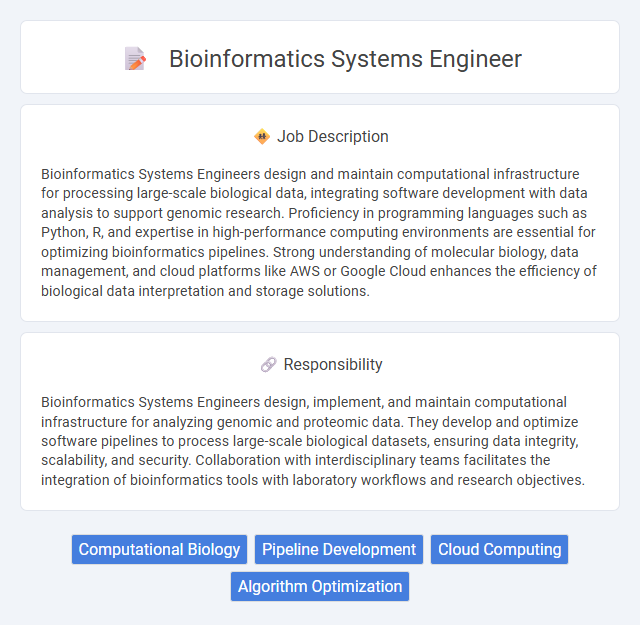
Bioinformatics Systems Engineers design and maintain computational infrastructure for processing large-scale biological data, integrating software development with data analysis to support genomic research. Proficiency in programming languages such as Python, R, and expertise in high-performance computing environments are essential for optimizing bioinformatics pipelines. Strong understanding of molecular biology, data management, and cloud platforms like AWS or Google Cloud enhances the efficiency of biological data interpretation and storage solutions.
Individuals with a strong background in both biology and computer science are likely suited for a Bioinformatics Systems Engineer role, as it demands interdisciplinary expertise. Those who enjoy problem-solving, working with complex data sets, and developing computational tools may find this job highly engaging and fulfilling. Candidates lacking technical skills or interest in continuous learning might struggle to meet the challenges inherent in this dynamic field.
Qualification
A Bioinformatics Systems Engineer requires expertise in computational biology, software development, and systems architecture. Proficiency in programming languages such as Python, R, and Java, combined with experience in managing large-scale genomic databases and bioinformatics pipelines, is essential. A strong background in molecular biology, data analysis, Linux-based systems, and cloud computing platforms such as AWS or Google Cloud is highly valued in this role.
Responsibility
Bioinformatics Systems Engineers design, implement, and maintain computational infrastructure for analyzing genomic and proteomic data. They develop and optimize software pipelines to process large-scale biological datasets, ensuring data integrity, scalability, and security. Collaboration with interdisciplinary teams facilitates the integration of bioinformatics tools with laboratory workflows and research objectives.
Benefit
Bioinformatics Systems Engineer roles likely offer significant benefits such as access to cutting-edge genomic technologies and the opportunity to contribute to impactful medical research advancements. Professionals in this field probably enjoy competitive salaries and benefits packages given the specialized skill set required. The position may also provide career growth through interdisciplinary collaboration and exposure to evolving computational biology challenges.
Challenge
A Bioinformatics Systems Engineer likely faces the challenge of integrating complex biological data with advanced computational systems to enable efficient analysis and interpretation. Managing scalability and performance issues in processing large genomic datasets may also present significant technical hurdles. The role probably demands continuous adaptation to emerging technologies and evolving scientific methodologies to maintain cutting-edge solutions.
Career Advancement
Bioinformatics Systems Engineers develop and maintain computational tools that analyze biological data, driving innovation in genomics, proteomics, and personalized medicine. Mastery of programming languages like Python and R, alongside experience with cloud computing and big data platforms, enhances job performance and opens pathways to leadership roles or specialized research positions. Advancing in this career often involves gaining expertise in machine learning algorithms, securing professional certifications, and contributing to high-impact projects that influence biotech and pharmaceutical industries.
Key Terms
Computational Biology
A Bioinformatics Systems Engineer specializing in Computational Biology develops and maintains software tools that analyze biological data, such as genomic sequences and protein structures. Expertise in algorithms, machine learning, and high-performance computing enables efficient data processing and accurate modeling of complex biological systems. Proficiency in programming languages like Python, R, and experience with bioinformatics platforms accelerates research and innovation in fields like drug discovery and personalized medicine.
Pipeline Development
Bioinformatics Systems Engineers specializing in pipeline development design and implement automated workflows to process large-scale genomic data efficiently. They utilize programming languages such as Python, Bash, and Nextflow to create scalable, reproducible pipelines that integrate various bioinformatics tools and databases. Expertise in cloud computing platforms like AWS or Google Cloud is essential to optimize data storage, computational resources, and parallel processing for high-throughput analyses.
Cloud Computing
Bioinformatics Systems Engineers specializing in cloud computing design and implement scalable data analysis pipelines on platforms such as AWS, Google Cloud, and Azure to process large genomic datasets efficiently. They optimize computational workflows using containerization technologies like Docker and orchestration tools such as Kubernetes to enhance reproducibility and resource management. Expertise in cloud-native services, including serverless computing and distributed storage systems, is essential for accelerating bioinformatics research and reducing infrastructure costs.
Algorithm Optimization
Bioinformatics Systems Engineers specialize in algorithm optimization to enhance data processing efficiency in genomics and proteomics research. They develop scalable computational pipelines that reduce runtime and improve accuracy in sequence alignment, variant calling, and functional annotation. Expertise in parallel computing, machine learning integration, and memory management is critical for managing large-scale biological datasets effectively.
 kuljobs.com
kuljobs.com